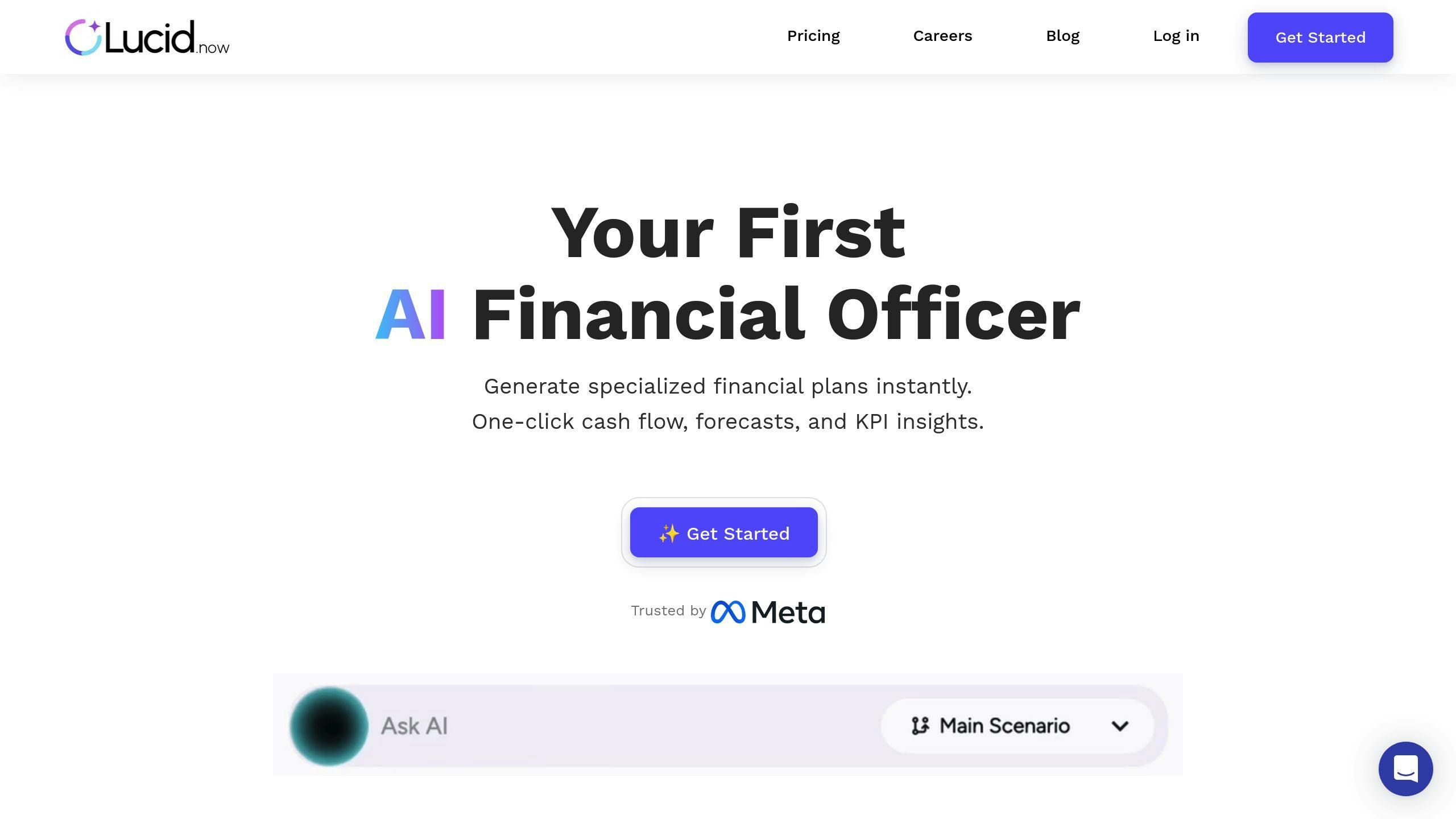AI is changing how businesses communicate with investors by automating tasks, providing real-time insights, and personalizing interactions. Here’s what you need to know:
- Automated Investor Updates: AI tools generate accurate reports, saving 70% of time and reducing errors by 90%.
- Personalized Communication: Tailored updates based on investor preferences, time zones, and interests.
- Data Analysis: AI processes large volumes of financial data quickly, offering predictive analytics with 60% accuracy.
- Streamlined Reporting: Real-time, error-free financial reports with built-in compliance tracking.
- 24/7 Support: AI chatbots handle common investor queries instantly.
These advancements make investor communication faster, more accurate, and easier to manage, helping businesses build stronger relationships with stakeholders.
How I Use AI to Turn Spreadsheet lines into Financial Reports
Automating Investor Updates
AI technology has reshaped how investor updates are handled, turning time-consuming manual tasks into efficient, automated processes. These tools not only save time but also ensure accuracy and a personal touch in communications.
AI-Generated Reports for Accurate Updates
AI systems connect with financial platforms to create real-time reports, cutting down on manual errors and delivering consistent results. Tasks like gathering data, generating reports, and distributing them are fully automated. This approach reduces mistakes by 90% and saves 70% of the time compared to traditional methods.
Visible AI is a great example of this in action. One of their clients shared:
"Visible's AI Inbox has revolutionized our communication management at Fuel Ventures Ltd. Its seamless integration of AI provides invaluable insights, streamlining our workflow. A game-changer for any VC firm looking to stay ahead" [1]
But AI doesn't stop at automation - it also tailors updates to meet the specific needs of each investor.
Personalizing Updates for Investor Needs
AI tools analyze investor preferences to deliver updates in their preferred formats and on their schedules. For instance, Lucid Financials integrates with platforms like QuickBooks to provide real-time, customized updates [2].
The benefits of this tailored approach are clear from user experiences:
"Leveraging Visible has been a game changer for 01A. Its ability to automate metric collection, ensure compliance, and consolidate investor updates and reporting has not only streamlined communication and decision-making but also provided full transparency to the entire team" [1]
Some standout personalization features include:
- Custom metrics tailored to individual investor interests
- Scheduled updates that account for different time zones
- Depth adjustments in analysis based on investor type
- Translation options for global audiences
This level of customization makes investor communication not just efficient but also highly relevant to each recipient.
Improving Data Analysis and Insights
AI is reshaping how investor communications handle data, offering faster and more precise analysis of complex financial information. It transforms raw numbers into insights that stakeholders can act on.
Efficient Processing of Large Data Volumes
AI tools can quickly and accurately process large sets of financial data, turning them into actionable insights. For instance, studies reveal that AI predicts future earnings with 60% accuracy, compared to 53% for human analysts [2]. This edge allows companies to share more reliable and timely information with investors.
By integrating real-time data, recognizing patterns, and analyzing multiple sources, AI delivers a well-rounded view of financial performance. A great example is Vena Insights, which pinpoints factors affecting financial outcomes in seconds. This helps finance teams highlight key trends and communicate them effectively to investors [4].
Predictive Analytics for Future Planning
The 2023 Global FinTech Report by PwC highlights that 56% of financial institutions are focusing on predictive analytics to enhance their insights and tailor services [3]. AI-powered models help spot trends, assess risks, and allocate resources efficiently, enabling smarter decision-making.
"By harnessing these insights, financial institutions can make more informed decisions, optimize their portfolios, and gain a competitive edge" [3].
Lucid Financials takes this a step further by blending advanced analytics with user-friendly tools. Its integration with various financial systems ensures consistent communication with stakeholders while leveraging AI to deliver clear, actionable insights [2].
This approach not only helps companies address investor concerns more effectively but also strengthens their ability to share opportunities with clarity and confidence. AI doesn’t just crunch numbers - it transforms how businesses engage with investors.
sbb-itb-17e8ec9
Customizing Investor Interactions
AI is changing the way companies communicate with investors by offering personalized experiences that align with each investor's unique needs.
Investor Profiling and Segmentation
By analyzing factors like investment history and risk preferences, AI generates detailed investor profiles. This allows businesses to identify patterns that might go unnoticed with older methods, enabling better segmentation. Companies adopting AI-driven personalization strategies see up to 40% higher revenue compared to their competitors [1].
For instance, during their $7.8 billion fundraising campaign, Andreessen Horowitz used AI-powered profiling to cut response times, increase engagement by 35%, and dedicate 40% more time to strategic tasks [6]. This kind of tailored approach strengthens trust and makes investors feel valued - key to building lasting relationships.
Automated Responses to Common Investor Inquiries
AI chatbots and virtual assistants are reshaping investor communications by interpreting and addressing queries in real time. These tools can share key metrics, provide instant overviews, and answer FAQs, ensuring consistent support around the clock.
"AI enhances investor relations by automating tasks, providing insights, and personalizing interactions", says Muhammad Habib, CFA, ACCA [1].
Companies like Disney and Box have successfully adopted AI-driven communication systems for their investor relations [1]. Lucid Financials, for example, uses AI tools integrated with real-time financial data to handle routine inquiries [6].
While automation plays a big role, human oversight remains essential to ensure these systems are effective and responsive. By blending segmentation, automation, and live insights, AI not only improves interactions but also streamlines reporting processes.
Improving Reporting Processes
AI is transforming financial reporting by making it faster and more precise. In fact, 97% of financial reporting leaders plan to expand their use of generative AI within the next three years. This shift not only saves time but also delivers clearer, more dependable insights for investors.
Generating Dynamic Financial Reports
AI-powered tools can create detailed financial reports in just hours by pulling and analyzing data from various sources. This provides real-time insights that investors can trust.
"The end result of an AI-automated process is data with fewer errors", says a DFIN Author, emphasizing the improved accuracy AI brings to financial reporting [5].
These platforms handle tasks like:
- Tax liability calculations
- Currency conversions
- Cash flow forecasting
- Asset reconciliation
Ensuring Compliance in Reporting
AI systems simplify compliance by embedding regulatory requirements directly into the reporting process. They automatically track regulatory changes and update reports accordingly, cutting down on restatements and SEC inquiries [2]. This built-in adaptability helps ensure all financial documents remain compliant.
Integration with Lucid Financials

Lucid Financials is a great example of how AI platforms can simplify reporting for investors. Its Professional plan, priced between $150 and $600 per month, is designed for businesses managing up to $500,000 in monthly expenses.
With this platform, companies can:
- Instantly create financial plans
- Compare multiple scenarios
- Access industry benchmarks
- Monitor key performance indicators
Conclusion
AI is reshaping investor communication by automating tasks, delivering sharper insights, and enabling tailored interactions. These advancements are changing how companies connect with investors, making the process faster, more accurate, and more effective.
Here’s how AI has made a difference: It automates reporting, allowing companies to produce real-time, error-free financial reports. It processes data at incredible speeds, giving investors deeper, forward-looking insights. And it personalizes communication, adapting to individual investor preferences for more engaging interactions. As these technologies advance, their role in transforming investor communication will only expand.
Looking ahead, AI’s role will likely focus on predictive analytics, personalized messaging, automated compliance checks, and real-time reporting. By adopting AI tools now, companies can not only improve their current processes but also stay ahead of the curve as these technologies grow more sophisticated.
The shift AI brings isn’t just about doing things faster - it’s about building investor communication that is clearer, more responsive, and better aligned with stakeholder needs. Companies that embrace AI today will be better prepared to meet the demands of tomorrow’s investor landscape.
FAQs
How to use AI in financial reporting?
AI is changing how companies communicate with investors by automating the processing of financial data. It can handle information from various sources quickly and consistently, making reporting more efficient. For instance, tools like Lucid Financials streamline real-time reporting by automating data integration and analysis.
AI also helps predict financial outcomes by studying past data and trends. This allows businesses to provide more accurate earnings forecasts and manage investor expectations more effectively. Additionally, AI-powered chatbots can answer investor questions around the clock, offering quick responses to common inquiries about financial performance and metrics.
When choosing AI tools for financial reporting, look for features like:
- Integration with your current financial systems
- Strong data protection protocols
- Customizable templates for reports
- Real-time analytics to track performance


